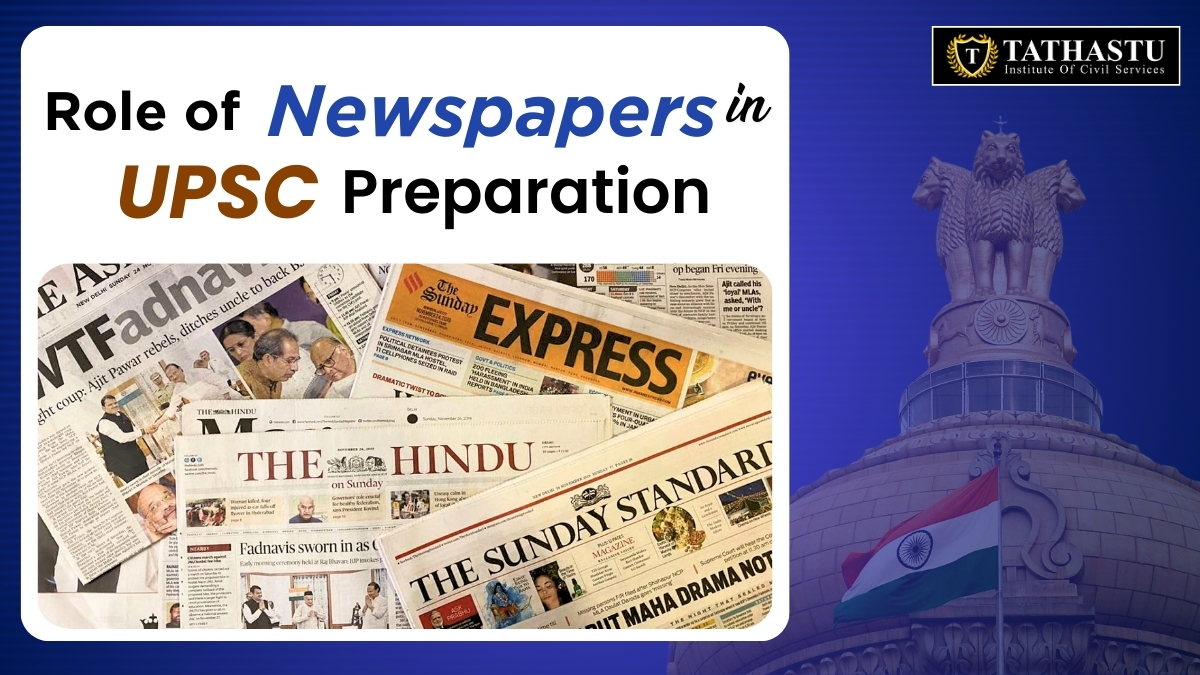New Evening & Weekend Batches - Learn More
Click Here
The UPSC Civil Services Examination (CSE) is a marathon that demands knowledge of static subjects and a deep understanding of current affairs, fostered by an informed and analytical mind. In this pursuit, newspapers, with their daily dose of news and analysis, become an invaluable resource for UPSC aspirants.
Textbooks lay the foundation, but newspapers act as the bridge to the real world. They keep you informed about current affairs, government policies, and socio-economic issues – all essential for UPSC success. However, going through the vast ocean of information they present can be daunting. So, here's a comprehensive guide to transforming newspapers from information overload to a power tool for your UPSC preparation.
Newspapers offer a treasure trove of benefits for UPSC aspirants:
Comprehensiveness: They cover a wide range of topics, aligning with the vast UPSC syllabus. From polity and economy to science and technology, newspapers keep you informed about national and international issues.
In-depth Analysis: Editorials and opinion pieces provide insightful perspectives on current events, fostering critical thinking and a nuanced understanding of complex issues.
Vocabulary Enhancement: Regular newspaper reading exposes you to a rich vocabulary, improving your writing skills and expression – crucial for the Language paper, Mains exam, and the Interview.
Developing an Informed Opinion: Newspapers present diverse viewpoints, encouraging you to form your own well-reasoned opinions. This ability to analyze and present arguments is essential for essay writing and answer construction in the Mains exam.
Context is Key: Newspapers keep you abreast of government policies and their implications, allowing you to link current affairs with static knowledge for a holistic understanding.
While newspapers are a goldmine, simply reading them cover-to-cover won't suffice. Here's how to optimize your newspaper reading for UPSC preparation:
Choose Your Sources Wisely: Select reputed newspapers known for their balanced reporting and insightful analysis. Popular choices among UPSC aspirants include The Hindu, The Indian Express, and The Economic Times.
Develop a Selective Reading Habit: Don't get into every detail. Focus on sections relevant to the UPSC syllabus, like national and international news, polity and governance, economy and business, science and technology, and social issues.
Prioritize Content: Within these sections, prioritize news articles with national or international significance. Look for those covering government policies, judicial pronouncements, important summits, and global issues with ramifications for India.
Deconstruct the News: Don't just skim headlines. Read with a critical eye, analyzing the "who, what, when, where, why, and how" of an issue. Understand the background, key players, potential consequences, and government response (if any).
Engage with Editorials and Opinion Pieces: These sections offer valuable insights from experts and analysts. Analyze different viewpoints, identify commonalities and contradictions, and form your own well-reasoned opinion.
Don't Neglect Government Sources: Supplement your newspaper reading with official government websites like the Press Information Bureau (PIB) and websites of relevant ministries. Magazines like Yojana and Kurukshetra ensure you have access to verified information and government perspectives.
Reading newspapers is just one part of the equation. Effective note-making is crucial for retaining information and easy revision. Here are some tips:
Maintain a Dedicated Notebook: Create a separate notebook specifically for UPSC-related news clippings and notes. This ensures organized study and easy retrieval of information. It will be more beneficial if you separate notes of each section like polity, economy, science and technology, etc.
Develop a Note-Taking System: Experiment and find a system that works for you. A newspaper or News app, a YouTube channel, or a podcast. Choose whatever satisfies and suits you the best!
Capture the Essence: Don't transcribe entire articles. Summarize key points, facts, and figures. Use mind maps or flowcharts. Note down important figures, places, names, and different perspectives presented in the article.
Link the News to the Syllabus: As you take notes, identify how the current event relates to specific topics in the UPSC syllabus. This helps in building a cohesive understanding of various subjects.
Effective newspaper reading is not about speed; it's about focus and understanding. The magic happens when you connect the dots. Don't see current affairs as a separate entity from your UPSC syllabus. Look for ways to link news articles back to the static subjects you're studying. For example, while studying India's foreign policy, revisit your notes to understand its background and implications. This not only reinforces your understanding of both topics but also makes the entire learning process more interesting and relevant.
So, keep going and leverage your newspaper learnings as a powerful tool to drive you toward UPSC success!

Learning is the process of acquiring new or modifying existing knowledge, behaviours, skills, values or preferences.